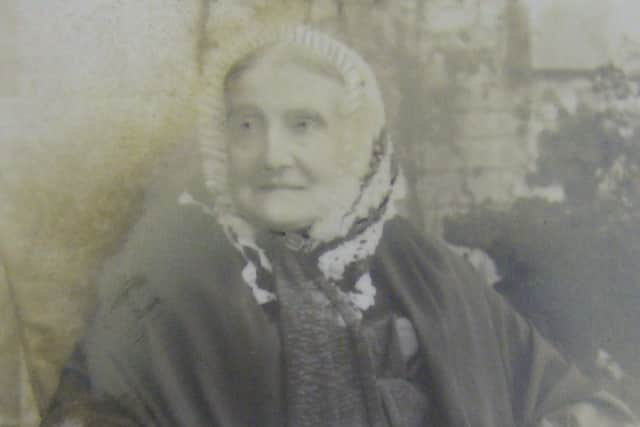Saving the once-forgotten grave of Sheffield anti-slavery heroine


She was one of the nation’s leading lights in the fight to abolish slavery and a feminist pioneer who predated the Suffragette movement. But for decades, the grave of Mary Anne Rawson has lain untouched and uncared for in a disused burial ground in Sheffield.
It looked as though the historic site may be lose forever when the disused graveyard in Attercliffe was put up for sale early last year by the United Reformed Church which owns the land.
Advertisement
Hide AdAdvertisement
Hide AdBut news of the planned sale reached local campaigners who were aware of the site’s significance - and they have now embarked on a last-ditch fundraising campaign to buy the site themselves and save Rawson’s grave for posterity.


They need to raise £15,000 by January 25 to make the purchase but are growing increasingly hopeful of hitting their target as a crowd-funding appeal gathers pace.
Penny Rea, chair of the Friends of Zion Graveyard group, says she had been aware the grave was at the site for about five years thanks to a local history project but sprung into action after hearing the site was going to be sold early last year.
After persuading the landowners to give them access to look for the grave, the group managed to locate it within minutes.
Advertisement
Hide AdAdvertisement
Hide Ad“It took a couple of months to be allowed access and they had to cut through the undergrowth with a machete. The grave was really overgrown but quite amazingly we found it intact. It took just 20 minutes as one of our group had done conservation work in graveyards before and had an idea where to look. He said ‘I think it will be in that corner’ and then plunged into this tangle of trees and deadwood. He swept the undergrowth away and we saw the family name. It was absolutely extraordinary and it sent shivers down my spine.


“We eventually found 58 graves on the site, many of them were early industrialists with very interesting stories of their own.
“As soon as we realised her grave was intact and relatively undamaged we realised this is actually a significant historical site. We started talking to Historic England and the Heritage Lottery Fund. At that stage we were just a group of people, so we launched the Friends group.”
The United Reformed Church which owns the land has given them six months to raise the necessary money to purchase the graveyard. The land next to it where an adjoining church used to stand has already been turned into a car storage compound - which would have been the fate of the graveyard if it were not for the campaign.
Advertisement
Hide AdAdvertisement
Hide AdRea says that in total around £15,000 is needed to complete the purchase and pay legal fees. Campaigners have applied for a Heritage Lottery Fund grant of almost £10,000 and have raised £3,000 in donations already. A second crowdfunding campaign to raise an additional £2,000 is now close to hitting its target and any extra cash raised will be set aside for further work on restoring the grave.
Rea says Rawson was a fascinating woman with a great moral compass. “I have been researching her for about ten years as she lived in the house immediately opposite where I live. She was a forerunner of the feminist movement. She was widowed but left with a child at a very early age and was effectively a single parent. She unexpectedly inherited some money from her deceased husband’s family and used that to support her mother and sisters and fund her philanthropic work.
“She came before the Suffragette movement but was one of the very few women to attend the world’s first international anti-slavery conference.”
Rawson, born in 1801, was a founding member of the Sheffield Female Anti-Slavery Society, which campaigned for the rights of the slaves in the British Empire and was the first group in the country to call for an immediate end to slavery rather than a managed end to it.
Advertisement
Hide AdAdvertisement
Hide AdFollowing the Slavery Abolition Act of 1833 which ended slavery in the British Empire, the society was shut down.
But Rawson’s campaigning did not stop and in 1837 she became secretary of the Sheffield Ladies Association for the Universal Abolition of Slavery.
Rea says the ending of slavery in the British Empire was “not good enough” for Rawson, who wanted to see a ban imposed worldwide.
Rawson came from a background of campaigning - her mother was an anti-slavery campaigner and would frequently take her and her sisters out campaigning. Their family were non-conformist Protestants who had a habit of founding churches and had supported the Puritans during the English Civil War two centuries earlier.
Advertisement
Hide AdAdvertisement
Hide AdRea says Rawson was inspired to act because of her devout Christian faith.
“She had a motto of ‘Prayer without action is a mockery’. She really believed in putting the gospel into action.
“It is fair to say she kept the anti-slavery movement going. There are even records that when she was 74 or 75, she was still campaigning and was fighting against the enforced return of runaway slaves that the Navy were picking up at the time.”
She died at the age of 86 in 1887 and was buried next to the Zion Congregational Church in Attercliffe.
Advertisement
Hide AdAdvertisement
Hide AdRea says research indicates the church shut in the 1970s as a result of a planned road-widening scheme in the area before the building was eventually turned into a furniture storage depot. That then burned down in a fire in 1987, with the remains being demolished.
She says she hopes that if the sale goes through it will only take a few weeks to get the site ready to open for monthly public visits.
To find out more or to make a donation, email [email protected] or visit www.justgiving.com/crowdfunding/ziongraveyardattercliffe